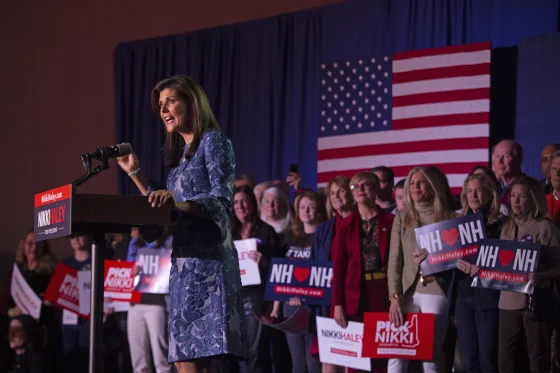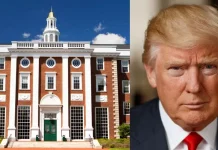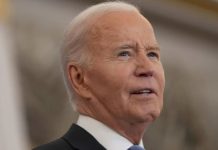From inside a hotel ballroom, with supporters whistling, screaming and bouncing campaign signs around her, Nikki Haley wasn’t about to let this be her last stand.
She had come too far to let it all go in one night, even as the pundits, the media and now another state’s voters were nudging her toward the exits just hours earlier.
On Tuesday night, fresh from a loss that followed a third-place finish in Iowa, Haley said she had too much fight in her to throw in the towel, despite Donald Trump’s attempts to turn his sights on a general election contest.
On the night of her second-place finish in New Hampshire, Haley, the former United Nations ambassador and governor of South Carolina, pledged to plow forward to her home state, insisting she still had a path.
“I have news for all of them. New Hampshire is first in the nation. It is not the last,” Haley said to cheers. “This race is far from over. There are dozens of states left to go, and the next one is my sweet state of South Carolina.”
Haley leaned into an argument that her path to beating Trump is one that’s incremental — building along the way from polling at 2% at the start of the race nearly a year ago to becoming the last person standing against Trump and winning nearly half the vote in New Hampshire. She also took the chance to throw bombs at Trump and his electability.
“With Donald Trump, Republicans have lost almost every competitive election. We lost the Senate. We lost the House. We lost the White House. We lost in 2018. We lost in 2020, and we lost in 2022,” Haley said. “The worst-kept secret in politics is how badly the Democrats want to run against Donald Trump. They know Trump is the only Republican in the country who Joe Biden can defeat.”
Long before the results were in, Haley world insisted it had every expectation of moving forward. Allies say the campaign has operated frugally since last year and still has gas in the tank.
As of Tuesday night, she had fundraising trips planned for New York, California and Florida. An outside super PAC, Americans for Prosperity — which has provided on-the-ground support for Haley — said it didn’t need to see an outright win in New Hampshire to keep moving forward; it was more important to promote a Republican who was electable enough to beat Biden and lift GOP candidates competing in lower-level races on the ballot.
“Aside from her really having a poor showing, we would continue. We are already laying the groundwork not just in South Carolina but in many of those Super Tuesday states,” Drew Klein, a senior adviser to AFP Action, said before the results. “We’re planning now to move on to South Carolina and continue our efforts in that state and continue moving forward.”
Haley still had a rally in Charleston planned for Wednesday and had already started spending money on a previously announced $4 million ad buy there.
“Nikki Haley shocked the world before. She did it numerous times in South Carolina politics,” said Alex Stroman, the executive director of the South Carolina Republican Party. A strong Haley showing, he said, “sets it up for there to be 32 days of barnstorming the state. South Carolina is not New Hampshire and not Iowa; it is truly a microcosm of what the Republican Party looks like.”
And he — as well as the campaign itself — noted that the state has open primaries, which means Democrats can vote in the election. Trump had railed against Haley in the run-up to New Hampshire, accusing her of drawing Democratic support in a GOP primary.
Haley’s supporters, however, have stuck with her, saying she has demonstrated she could beat the odds in a crowded race against others who were polling higher and funded better.
“Her catch phrase is ‘slow and steady wins the race.’ We’re going to keep chipping away, adding voters, and adding donors each day in each primary,” said Bill Strong, a donor and member of Haley’s campaign executive committee.
With a third-place finish in Iowa followed by a second-place showing — out of two candidates — Haley still has an uphill battle.
Trump has already locked down support of ranking Republicans in her home state, including Gov. Henry McMaster and a onetime GOP presidential contender, Sen. Tim Scott. Though there’s a dearth of recent polls, those available laid out an uphill battle for Haley. In November, Trump led Haley 48% to 19% in a Winthrop University survey. Meanwhile, a Trump-aligned pollster released a survey claiming a nearly 40-point lead in the state.
Bill O’Brien, a Republican National Committeeman in New Hampshire who is neutral in the primary, said before the results came in that it would be tough for Haley to go on if she didn’t win one of the first two states.
“I find it difficult to see an open avenue for her to go on to the nomination,” O’Brien said, adding that he doesn’t think any other state “is going to be all that different.”
The Haley campaign has asserted that she has a path because more Super Tuesday states resemble New Hampshire than Iowa. O’Brien, though, said it was a tough argument to make if she didn’t win New Hampshire.
On Tuesday night, Trump’s allies attempted to move toward a general election posture and hit Haley for trying to move on.
“Nikki Haley said she’s running to stop the re-election of Harris-Biden. Yet, without a viable path to victory, every day she stays in this race is another day she delivers to the Harris-Biden campaign,” Taylor Budowich, the CEO of Make America Great Again Inc., said in a statement. “It’s time for unity; it’s time to take the fight to the Democrats, and for Nikki Haley: it’s time to drop out.”
A senior Trump campaign official told NBC News that if Haley stays in the race, she will face a higher level of aggressiveness. The official said it would be focused on her record as governor and the idea that those who know her the best like her the least — but not personal attacks like the birthed issue (which Trump has already brought up).
Haley’s supporters, led by her top surrogate — Gov. Chris Sununu — spent the closing days of the race in New Hampshire attempting to clap back at repeated suggestions that Haley had to win New Hampshire to move forward, accusing the media and the political elite of moving the goal posts for any measure of success.
“Roughly 50 percent of Republican primary voters want an alternative to Donald Trump. Seventy-five percent of the country wants an option other than Donald Trump and Joe Biden. And while members of Congress, the press, and many of the weak-kneed fellas who ran for president are giving up and giving in — we aren’t going anywhere,” Haley campaign manager Betsy Ankney said in a memo released Tuesday morning.
“Then it’s on to Super Tuesday on March 5, where, despite the media narrative, there is significant fertile ground for Nikki. Eleven of the 16 Super Tuesday states have open or semi-open primaries. Of the 874 delegates available on Super Tuesday, roughly two thirds are in states with open or semi-open primaries,” she added in the memo.
The conventional storyline was that New Hampshire’s outsize number of independent voters created ideal conditions for a Haley win, because those seeking an alternative to Trump would congregate around her. But Trump, according to tracking polls, was locking down the Republican base.
NBC News exit polls Tuesday showed there was a healthy turnout of independents.
Though Haley was initially slow to ramp up events in New Hampshire right after the Iowa results, she quickly changed course and darted around the state, with Sununu vigorously stumping for her along the way. She presented a case that she would bring generational change to a Republican Party that needed to leave behind the “chaos” of the Trump years. She also leaned in on her electability, citing poll results showing she could definitively defeat Biden in a general election, while the same surveys showed a Biden-Trump race would be a toss-up.
On Monday, a day after Florida Gov. Ron DeSantis dropped out of the race, former U.S. Sen. John Sununu, the governor’s brother, scoffed at the suggestion that Haley was running in ideal conditions.
“This has only been a two-person race for 18 hours. You’re being ridiculous,” he said in an interview. “There are many [Super Tuesday] states where she already has great name ID and a great ground game. She’s basically achieved the objectives coming out of the campaign a year ago, and that’s build momentum in Iowa, do well in New Hampshire and take that going into South Carolina.”














